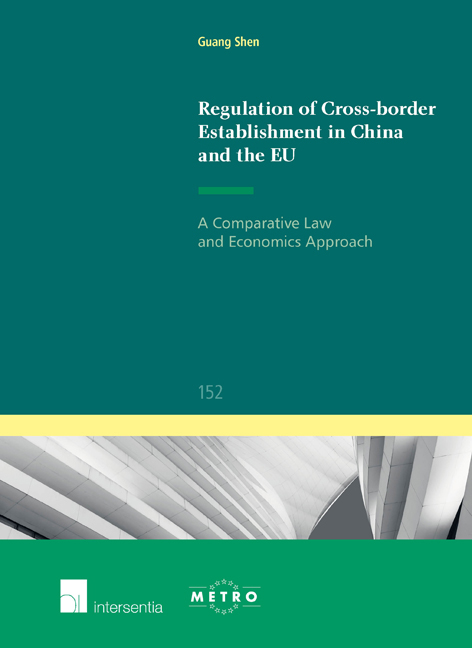Book contents
- Frontmatter
- Acknowledgements
- Contents
- List Of Abbreviations
- Chapter 1 Introduction
- PART I LEGAL ANALYSIS
- Chapter 2 Regulation Of The Inter-Provincial Establishment Of Companies In China
- Chapter 3 The EU Regulation Of Cross-Border Establishment Of Companies
- PART II THEORETICAL FRAMEWORK
- PART III ECONOMIC EVALUATION
- Valorisation Addendum
- Bibliography
- Curriculum Vitae
- Ius Commune Europaeum
Chapter 2 - Regulation Of The Inter-Provincial Establishment Of Companies In China
from PART I - LEGAL ANALYSIS
Published online by Cambridge University Press: 13 December 2017
- Frontmatter
- Acknowledgements
- Contents
- List Of Abbreviations
- Chapter 1 Introduction
- PART I LEGAL ANALYSIS
- Chapter 2 Regulation Of The Inter-Provincial Establishment Of Companies In China
- Chapter 3 The EU Regulation Of Cross-Border Establishment Of Companies
- PART II THEORETICAL FRAMEWORK
- PART III ECONOMIC EVALUATION
- Valorisation Addendum
- Bibliography
- Curriculum Vitae
- Ius Commune Europaeum
Summary
Introduction
This chapter considers (potential) barriers hindering the inter-provincial establishment of companies in China. It elaborates the rules governing such establishment, examines their implementation in practice, explores existing solutions to tackle the obstacles to inter-provincial establishment, and investigates their enforcement effects. The objective of Chapter 2 is to demonstrate whether the obstacles stem from the legal provisions themselves or from the implementation of the rules on the inter-provincial establishment for companies.
Sections 2, 3 and 4 of this chapter discuss the rules on the establishment of a domestic company, the rules on the establishment of Foreign Invested Enterprises (FIEs) and the rules on the inter-provincial establishment for companies in China, respectively. The elaboration of these provisions aims to examine whether the legal barriers for the establishment of companies in China can be erected according to law in the books.
Section 5 and section 6 study the actual situation of the inter-provincial establishment for domestic companies and FIEs in China, respectively. This chapter focuses only on the application of the rules on the inter-provincial establishment for companies. The aim is to analyse whether the execution of the rules can lead to barriers to the inter-provincial establishment of companies.
Section 7 interprets the laws coping with administrative monopolies in China. It is designed to evaluate whether such laws can ensure freedom in the interprovincial establishment of companies in China. The interpretation and enforcement of the rules governing this establishment are also studied in this section. This is because the research on the effectiveness of the anti-monopoly rules can certainly reveal the real situation whether companies can establish businesses in another province freely. Moreover, how the rules on the inter-provincial establishment for companies are applied in practice can be examined.
Based on the analysis in the preceding sections, section 8 provides original ideas on the possible causes for the occurrence of obstacles to the inter-provincial establishment of companies in China. The reasons are viewed from two perspectives: the provision and the implementation of national law in China.
Section 9 outlines the important changes in regulation of establishment brought by the reform measures of 2013. The social background of this amendment is also pointed out. Moreover, section 8 explains that (probably due to opposition from central regulators) such changes have been instituted in a pilot project rather than in the whole nation at once.
- Type
- Chapter
- Information
- Publisher: IntersentiaPrint publication year: 2016



